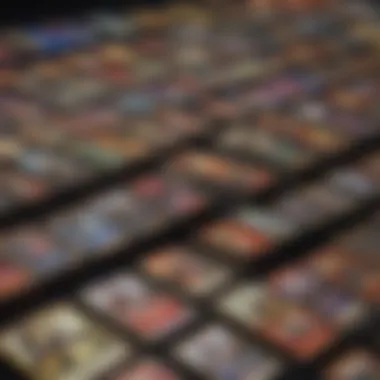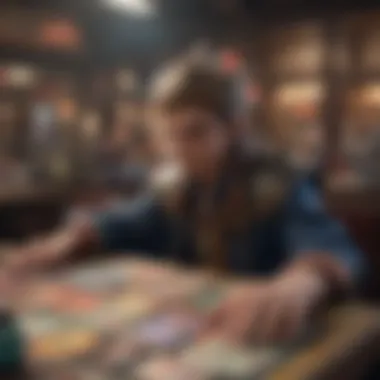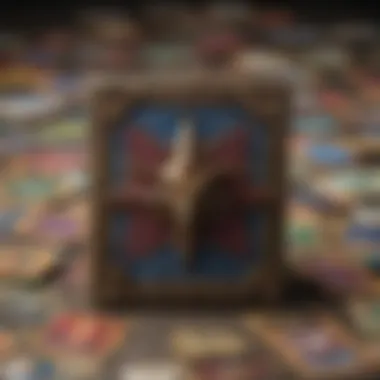The Intriguing Landscape of Yu-Gi-Oh Auctions


Intro
The world of Yu-Gi-Oh card auctions can seem complex. However, it holds significant value for collectors and enthusiasts. Auctions create a platform where rare and sought-after cards can find new homes. They also reflect changing trends within the community. Knowing how to navigate this space is essential for anyone looking to invest or expand their collection.
Auctions have become a vital part of the Yu-Gi-Oh experience. Understanding their dynamics involves grasping several factors such as market value, auction methods, and technology's influence. The nature of collecting Yu-Gi-Oh cards extends beyond mere acquisition; it encapsulates the excitement of communal interaction, engagement in competitive gameplay, and the cultural impact of this beloved card game.
In the following sections, we will delve into various aspects of Yu-Gi-Oh auctions. We will explore current trends, auction houses, and essential valuation methods. Readers can expect a detailed examination of how these factors intertwine. The aim is to provide clarity in a niche that is perhaps already intricate for many.
Prelims to Yu-Gi-Oh Auctions
Yu-Gi-Oh auctions represent a unique and fascinating segment of the collectible card game community. While many may think of these auctions as mere transactions where cards change hands, the reality is far more intricate. These events serve as a vibrant marketplace for collectors, investors, and enthusiasts alike, each with their own motivations and expectations.
Understanding Yu-Gi-Oh auctions is essential for anyone involved in the hobby, whether they are seasoned veterans or newcomers. This section aims to illuminate the fundamental aspects of such auctions, highlighting why they are crucial to the ecosystem of Yu-Gi-Oh collectibles.
In the world of collecting, auctions offer several benefits. First, they create access to exclusive cards that might not be available in traditional retail. Often, rare cards can be found only in auction formats. This dramatically enhances their allure for collectors who seek unique items to complete their collections. Furthermore, auctions establish market values for various cards, influencing how individuals perceive their worth.
Additionally, participating in an auction can instill a sense of community among collectors. Individuals gather to share their passion, trade stories, and information. It enhances engagement beyond just the cards themselves, fostering connections that can last beyond the auction event.
Despite the appeal, there are considerations to keep in mind. Bidder anxiety is a common phenomenon; participants might feel pressure to act swiftly, which can lead to overspending. Thus, understanding bidding strategies and the overall auction process becomes vital to ensure informed decision-making.
"Yu-Gi-Oh auctions are more than just selling cards; they are about building a community and establishing value in collectibles."
In summary, comprehending the nuances of Yu-Gi-Oh auctions offers profound insights into the collectible card game scene. It not only enhances one's appreciation for individual cards but also for the entire culture surrounding Yu-Gi-Oh. Readers will gain the knowledge necessary to navigate these auctions effectively, enriching their collecting journey.
The History of Yu-Gi-Oh Collectibles
The history of Yu-Gi-Oh collectibles is a significant part of understanding the market today. It outlines how these items transitioned from promotional tools in a children's card game to valuable assets for collectors around the world. This evolution tells a story about cultural impact, market dynamics, and community engagement.
Yu-Gi-Oh was initially introduced as a manga series in the 1990s, created by Kazuki Takahashi. The franchise expanded quickly, leading to the card game release in 1999. The early cards were basic in design and function but captured the imagination of a generation. As the game gained popularity, certain cards began to stand out due to their rarity and playability.
Key periods of interest include:
- Release of iconic sets: The early sets like Legend of Blue Eyes White Dragon became classics. Cards from these sets are highly sought after today.
- Competitive scene growth: With international tournaments forming, certain cards gained status as essential components of winning decks. This propelled their value.
- Limited editions and promotional releases: Special cards released during events or anniversaries created a sense of urgency among collectors, driving interest and prices up.
Understanding this history helps in recognizing what makes specific cards valuable in auctions. Collectors often consider the following historical factors:
- Card rarity: The number of cards printed affects demand. Rare cards can fetch substantial amounts at auctions.
- Cultural impact: Cards that resonate with fans, like those featuring popular characters or those that are central to beloved storylines, hold greater value.
- Collectible trends: Trends in collectibles evolve. For instance, nostalgia for early cards can boost their appeal and market activity.
"The collectibles market reflects deeper societal trends. Yu-Gi-Oh cards are not just game pieces; they are artifacts of a shared cultural experience."
With this foundation, it becomes evident how the history of Yu-Gi-Oh collectibles intertwines with current auction practices. This history is not just about card statistics but about understanding the evolution of a community, its passions, and the market's responsiveness to them.
Understanding the Auction Process for Yu-Gi-Oh Cards
Understanding the auction process for Yu-Gi-Oh cards is critical for collectors and enthusiasts. Auctions serve as a marketplace where individuals can buy and sell rare or valuable cards. This process allows for price discovery based on the demand and competition influencing the sale. Collectors benefit from this structure as it can potentially lead them to acquire sought-after items they may not find in traditional retail settings.
To navigate this environment effectively, it is essential to understand the different auction types and platforms available. Another important aspect is the awareness of how the bidding process operates, as this can significantly affect the final price of a card. Knowledge of these elements empowers collectors to make informed decisions when participating in auctions.
Types of Auctions


There are different types of auctions that collectors encounter when looking for Yu-Gi-Oh cards. Each type brings its own rules and dynamics. Common types include:
- English Auction: This is the most traditional format where bids start at a minimum price, and participants openly bid with increasing amounts. The highest bid at the end wins.
- Dutch Auction: In this format, the auction starts at a high price that decreases until someone accepts the current price. It favors quick decisions, making it different from the English type.
- Reserve Auction: Here, a minimum price is set that must be met before the card is sold. This protects sellers from low offers while allowing competitive bidding.
Understanding these types allows collectors to determine their strategy and approach based on the auction format chosen.
Live vs. Online Auctions
Live auctions involve in-person events where bidders compete face-to-face. These auctions often create a vibrant atmosphere and allow immediate interaction. Participants can feel the excitement, and sometimes items are on display for inspection. This approach can enhance the buying experience by creating a high-stakes environment. However, they require attendance, which can be a barrier to many collectors.
Online auctions, on the other hand, provide convenience and accessibility. Platforms like eBay and social media groups allow participants to list cards or place bids from anywhere. Bidders can take time to research cards, compare prices, and make informed decisions without being rushed by live competition.
Both auction formats have advantages and disadvantages. For example, online auctions often feature a broader reach, attracting more bidders, but they may lack the immediacy of live auctions. Understanding these nuances helps collectors choose the best method that aligns with their objectives and preferences.
Valuation of Yu-Gi-Oh Cards in Auctions
Valuation is at the core of Yu-Gi-Oh auctions, shaping how cards are priced and traded in the collectible market. Understanding how card values are determined can significantly affect both buyers and sellers in auction scenarios. Proper valuation helps collectors ascertain the worth of their cards, ensuring that they do not undervalue their possessions. Conversely, for buyers, knowing the market trends can prevent overpayment for a card. It also contributes to the overall health and sustainability of the collector community. Thus, navigating the complexities of valuation is fundamental.
Factors Influencing Card Values
Several key factors influence the market value of Yu-Gi-Oh cards during auctions. These aspects are often intertwined, creating a dynamic valuation environment.
- Rarity: The scarcity of a card is a primary determinant of its value. Limited editions or promotional releases generally command higher prices.
- Condition: The physical state of a card is crucial. Cards that are mint or near-mint condition fetch better prices compared to those that show wear or damage.
- Demand: Trends in demand can elevate a card’s value significantly. For instance, a popular character or archetype can drive up prices during auctions.
- Historical Significance: Cards that have played a notable role in the game’s history can also see increased desirability and, consequently, higher valuations.
- Cultural Impact: The influence of the Yu-Gi-Oh franchise across various media can affect card values. If a card is featured prominently in an anime episode or a movie, its value may spike due to renewed interest.
Understanding these factors allows collectors to make informed decisions, whether buying or selling.
Grading Systems Explained
Grading systems serve as a standardized method for assessing the condition and quality of Yu-Gi-Oh cards. Various grading companies provide certification that impacts a card's market value. The most notable organizations include PSA (Professional Sports Authenticator) and Beckett Grading Services (BGS).
- Numerical Grading Scale: Most grading systems use a numerical scale, often from 1 to 10, to represent a card's condition. A higher grade indicates better quality.
- Subgrades: In addition to overall grades, some companies provide subgrades that assess specific attributes: centering, corners, edges, and surface. These details offer collectors a more nuanced understanding of a card's quality.
- Market Relevance: Cards with a higher grade tend to sell for significantly more at auctions. This grading acts as a benchmark, influencing buyer behavior and valuation trends.
Understanding grading systems is essential for navigating Yu-Gi-Oh auctions. A well-graded card not only assures buyers of its quality but also enhances the seller's potential return on investment.
These grading systems, while adding a layer of complexity, provide a reliable framework for collectors to evaluate their cards accurately. Incorporating this knowledge into auction strategies can make a noticeable difference in achieving favorable outcomes.
Notable Auction Houses for Yu-Gi-Oh Cards
Understanding the notable auction houses specializing in Yu-Gi-Oh cards is crucial for collectors and enthusiasts. These auction houses serve as key platforms for buyers and sellers in the vibrant world of Yu-Gi-Oh. The significance of these venues goes beyond mere transactions; they shape the dynamics of the collectible card market, influencing pricing, availability, and trends. Furthermore, they provide a level of credibility and assurance that is vital for both novice and seasoned collectors navigating this niche.
Major Players in the Auction Industry
In the realm of Yu-Gi-Oh auctions, several major players stand out. These auction houses have established themselves through years of credible service and specialized knowledge in collectibles. Here are some noteworthy examples:
- Heritage Auctions: Renowned for its extensive reach and expert appraisals, Heritage Auctions attracts high-profile collectors and offers a diverse range of Yu-Gi-Oh cards. Its dedicated team of specialists ensures fair valuation and successful bidding processes.
- Goldin Auctions: This auction house gained recognition for its focus on not just traditional collectibles but also modern pop culture items. Its integration of technology into auctions enhances the user experience and broadens access to a global audience.
- Sotheby’s: As one of the most prestigious auction houses, Sotheby’s occasionally features high-end Yu-Gi-Oh items. Its reputation adds a layer of prestige to any auction lot, particularly for rare cards.
These auction houses often organize events that showcase the most sought-after cards. They set standards for authenticity verification and grading, which helps ensure that buyers acquire valuable pieces that are indeed genuine.
Specialized Yu-Gi-Oh Auction Events


Specialized auction events dedicated to Yu-Gi-Oh offer collectors unique opportunities to acquire exclusive items. Such events typically feature rare and collectible cards that are not easily found in standard sales.
- Annual Collectible Card Game Auctions: These events, commonly hosted by major auction houses, focus exclusively on trading cards. They highlight high-value Yu-Gi-Oh cards and draw serious collectors eager to compete for rare finds.
- Online Tournaments and Auctions: With the rise of technology, many specialized online platforms now host Yu-Gi-Oh auctions. These digital arenas allow collectors to bid on cards from virtually anywhere, increasing engagement and participation.
- Charity Auctions: Occasionally, specialized events are organized to support charities. These auctions contribute to a good cause while allowing collectors to expand their collections. The items auctioned are often unique, enhancing their appeal.
"Participating in specialized Yu-Gi-Oh auctions not only helps collectors find rare cards but also connects them with others who share similar passions."
The Role of Technology in Yu-Gi-Oh Auctions
Technology has transformed the landscape of Yu-Gi-Oh auctions in profound ways. With the rise of digital platforms and online marketplaces, enthusiasts now have access to a global audience. This development increases competition and can drive prices, benefiting both sellers and buyers. Technology enhances the auction process, making it more accessible, efficient, and engaging for collectors.
One significant aspect is the convenience that online auction platforms provide. Instead of being limited to physical locations, collectors can participate from anywhere in the world. Websites dedicated to trading card auctions, such as eBay and TCGPlayer, allow users to list their own Yu-Gi-Oh cards, set reserve prices, and track bids in real-time. This accessibility has expanded the market significantly, attracting more participants who otherwise may not engage in traditional auction settings.
Moreover, technology facilitates transparency in transactions. Online platform records enable users to view past auction results, revealing price trends over time. This information assists collectors in making informed purchasing decisions about their investments.
Another dimension is the social connectivity that modern technology fosters among collectors. Information and updates about rare cards and auction events circulate quickly through multiple channels, creating a sense of community among participants.
"The integration of technology in Yu-Gi-Oh auctions has created a more dynamic environment, benefiting both collectors and sellers."
Online Platforms and Marketplaces
Online platforms serve as the backbone of Yu-Gi-Oh auctions today. Websites like eBay and Troll and Toad provide sea of opportunities for collectors. Users can interact, sell, and purchase cards in a way that was impractical without technology. Each auction is a virtual event, with bids placed instead of faces seen. This aspect allows for a wider range of transactions and negotiations, as participants can interact from various time zones.
Many advanced marketplaces also offer additional features like price history analysis, grading services, and shipping tools. These features streamline the trading process and can enhance the overall experience for users. It offers resourceful insights into card values, ensuring that both buyers and sellers are informed about market trends.
Social Media Impact on Collecting
Social media platforms have altered how collectors share their interests and engage in auctions. Websites such as Reddit and Facebook have dedicated groups where fans of Yu-Gi-Oh can showcase their collections, discuss card values, and collaborate on strategies for bidding.
Such engagement fosters a culture of connection among collectors and encourages interaction that enhances the entire experience. Social media can foster real-time interactions around specific auctions, allowing individuals to ask questions and share insights. This level of communication can impact bidding strategies and even affect prices, creating a dynamic environment around auctions that is influenced by community sentiment.
In summary, technology has become essential in shaping Yu-Gi-Oh auctions. From online platforms providing broader access to social media offering a collective voice for collectors, these elements play a pivotal role in redefining the auction landscape.
Cultural Implications of Collecting Yu-Gi-Oh Cards
The culture surrounding Yu-Gi-Oh cards extends far beyond mere transactions. Collecting these cards often involves an intricate web of social interactions, community engagement, and shared experiences. The value of Yu-Gi-Oh cards is not only financial; it also encompasses emotional and cultural significance. These aspects are crucial for understanding the broader impact of Yu-Gi-Oh auctions within the collectible card game community.
The Community of Collectors
The community of Yu-Gi-Oh collectors is vibrant and diverse. This shared interest fosters connections among individuals across various backgrounds. Online forums and social media platforms, such as Reddit and Facebook, serve as significant areas for discussion and community building. As collectors exchange stories, tips, and trading ideas, a sense of belonging is cultivated.
Within this community, collectors often attend local tournaments and events. These gatherings provide an opportunity for enthusiasts to showcase their collections, share strategies, and engage in friendly competition. This camaraderie enhances the overall experience of collecting, making auction participation feel like part of a greater tradition.
Moreover, the community often supports charitable initiatives or fundraising events. Such activities not only break the boundaries of collecting but also build a profound sense of purpose among members.
Auctions as Social Events
Auctions for Yu-Gi-Oh cards are not merely marketplaces; they are social gatherings where enthusiasts come together. Attending auctions allows participants to meet like-minded individuals, exchange ideas, and share their passion for the game. The atmosphere at these events can be electric, filled with anticipation and excitement.
In many instances, face-to-face interactions during auctions foster networking opportunities. Experienced collectors provide insights and advice to newcomers, bridging knowledge gaps within the community. Additionally, the competitive yet fun atmosphere encourages healthy rivalry among bidders. This dynamic adds to the overall enjoyment of the auction experience.


Highlighting the social aspect, auctions often feature side events like workshops and panel discussions. Such activities enhance engagement, allowing attendees to learn more about grading, valuation, and market trends.
The cultural significance of Yu-Gi-Oh auctions transcends monetary value, enriching lives through community and interaction.
Market Trends Influencing Yu-Gi-Oh Auctions
Understanding the market trends influencing Yu-Gi-Oh auctions is essential for collectors and enthusiasts. The dynamics of the market can significantly affect card values, auction outcomes, and even the types of cards collectors prioritize. Economic factors, cultural shifts, and consumer behavior all play a role in shaping the auction landscape. By analyzing these elements, one can make informed decisions about purchasing and selling Yu-Gi-Oh cards.
Historical Price Trends
Examining historical price trends offers valuable insights into the evolving Yu-Gi-Oh market. Over the years, certain cards have risen dramatically in value, while others have dwindled. This fluctuation often reflects the broader trends within the gaming community, as well as external factors like the overall economic climate.
Data collected from reputable auction houses provides essential information on how card prices have shifted over time. For instance, iconic cards like the Blue-Eyes White Dragon often see significant price increases following notable auction events or competitions.
Analyzing historical prices helps collectors anticipate which cards might increase in value and which ones may not hold their worth. Key trends can reveal patterns, such as how certain sets increase in popularity after new game rules are introduced or when new mechanics are announced. This understanding can enhance one's strategy for participating in auctions.
Current Demand and Supply Dynamics
The current demand and supply dynamics present another layer of complexity in Yu-Gi-Oh auctions. The fluctuation in demand often correlates with factors like new releases or shifts in the competitive landscape. For example, if a new set is released that enhances the playability of a specific card, collectors may rush to acquire it, driving up its auction price.
Supply is also critical. Limited editions or cards from older sets may become scarce over time. As the available supply dwindles, the demand typically increases, resulting in higher auction prices. Understanding these dynamics can substantially impact one’s auction strategy. Moreover, social media platforms and online communities like Reddit and Facebook also influence demand. Discussions and hype around certain cards can spark interest in auctions, further increasing their value.
In summary, being aware of current demand and supply trends is vital for participating effectively in Yu-Gi-Oh auctions. Knowledge of these factors allows collectors to make strategic decisions, whether they are investing in cards to hold or selling when the market is favorable.
"The auction environment for Yu-Gi-Oh cards reflects not only personal tastes but also broader market trends and collector dynamics."
Predictions for the Future of Yu-Gi-Oh Auctions
Understanding the future of Yu-Gi-Oh auctions is essential for collectors and investors alike. This topic provides insights on the evolving dynamics and potential opportunities within the collectible card game community. As trends shift, the landscape for Yu-Gi-Oh cards changes as well. Therefore, exploring predictions can significantly aid individuals in making informed decisions about their collections and auction strategies.
Emerging Trends in Collecting
In the realm of Yu-Gi-Oh auctions, several trends are emerging. First, the influence of digital platforms cannot be ignored. Online marketplaces like eBay and specialized sites continue to grow. They offer accessibility and convenience for both buyers and sellers. This shift fosters a wider audience for auctions, even for rare cards that might have been previously out of reach.
Enthusiasts are also moving towards community-based collecting. This is evident in the rise of local meetups and group auctions. Collectors often prefer to engage face-to-face, allowing them to showcase their cards and find buyers within their communities. Such interactions not only enhance the experience but can drive up demand for certain cards, influencing their auction prices.
Another trend is the increasing importance of card grading. Collectors are more vigilant about authenticity, pushing for higher standards in card conditions. Cards graded by organizations like PSA or Beckett are becoming the norm in auctions. As a result, these graded cards may command higher prices, reflecting their perceived value and collectible status.
The Sustainability of the Market
Examining the sustainability of the Yu-Gi-Oh auction market reveals several critical factors. A core aspect is the continual introduction of new card sets. As new series are released, the interest in older cards can fluctuate. This change adds complexity to valuation and auction success, emphasizing the need for collectors to stay updated on market movements.
Moreover, the demographic of players is expanding. Yu-Gi-Oh now attracts a diverse audience, including a younger generation drawn to both the game and its collectibles. This growth opens avenues for higher auction engagement, ensuring that the market remains vibrant.
Additionally, the economic stability within the collectible market should not be overlooked. Fluctuating economic conditions can affect disposable income, thus influencing spending habits in auctions. Collectors need to be mindful of these shifts, as they may drastically impact card availability and prices.
Finale
In concluding this exploration of Yu-Gi-Oh auctions, it is essential to recognize their significance in the realm of collectible card gaming. Auctions are not merely a marketplace; they reflect the values and interests of the community. They serve as a dynamic arena where collectors manage to acquire rare cards, and sellers can realize the true worth of their items.
The various factors discussed in this article, including the valuation process and the impact of technology, highlight how constantly evolving trends shape the auction landscape. Additionally, engaging with auctions cultivates a deeper appreciation of the collectibles, bringing players and enthusiasts together.
One important aspect is the role of auction houses. They not only facilitate these transactions but also provide a platform for collectors to converge, enhancing the social fabric of the community. Moreover, understanding historical price trends allows participants to strategize better, leading to more informed buying and selling decisions.
Looking ahead, the sustainability of Yu-Gi-Oh auctions depends on ongoing interest and participation. Emerging trends, such as digital engagements and community events, signify a bright future.
To summarize, the significance of auctions in the Yu-Gi-Oh arena extends beyond economic transactions. They foster community, enhance knowledge, and bridge collectors with the cards they cherish. Collectors who comprehend the intricacies of the auction market are better positioned for success, ensuring they continue to enjoy this fascinating pursuit.



